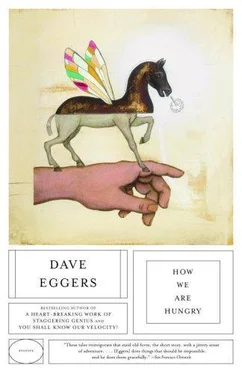Dave Eggers - How We Are Hungry
Здесь есть возможность читать онлайн «Dave Eggers - How We Are Hungry» весь текст электронной книги совершенно бесплатно (целиком полную версию без сокращений). В некоторых случаях можно слушать аудио, скачать через торрент в формате fb2 и присутствует краткое содержание. Год выпуска: 2005, Издательство: Vintage Canada, Жанр: Современная проза, на английском языке. Описание произведения, (предисловие) а так же отзывы посетителей доступны на портале библиотеки ЛибКат.
- Название:How We Are Hungry
- Автор:
- Издательство:Vintage Canada
- Жанр:
- Год:2005
- ISBN:нет данных
- Рейтинг книги:3 / 5. Голосов: 1
-
Избранное:Добавить в избранное
- Отзывы:
-
Ваша оценка:
- 60
- 1
- 2
- 3
- 4
- 5
How We Are Hungry: краткое содержание, описание и аннотация
Предлагаем к чтению аннотацию, описание, краткое содержание или предисловие (зависит от того, что написал сам автор книги «How We Are Hungry»). Если вы не нашли необходимую информацию о книге — напишите в комментариях, мы постараемся отыскать её.
A Heartbreaking Work of Staggering Genius
How We Are Hungry — читать онлайн бесплатно полную книгу (весь текст) целиком
Ниже представлен текст книги, разбитый по страницам. Система сохранения места последней прочитанной страницы, позволяет с удобством читать онлайн бесплатно книгу «How We Are Hungry», без необходимости каждый раз заново искать на чём Вы остановились. Поставьте закладку, и сможете в любой момент перейти на страницу, на которой закончили чтение.
Интервал:
Закладка:
“Probably get some younger guys,” Frank says. “The younger guys are hungry.”
“Like the B-team, right?” Jerry says. “We’re getting the B-TEAM!” He looks around for laughs but no one’s wet cold face will smile. “Minor leaguers, right?” he says, then gives up.
It is much too late to go home now, Rita knows. Still, she can’t suppress the thought of running all the way, ten miles or so, mostly downhill, back to the hotel, at which point she would — no matter what the cost — fly to warm and flat Zanzibar, to drink and drink until half-blind in the sun.
Nearby in the parking lot, Patrick seems to settle something with the man he’s speaking to and approaches the group.
“Very wet,” he says, with a grimace. “Long day.”
The group is going to the peak, a four-day trip up, two down, along the Machame Route. There are at least five paths up the mountain, depending on what a hiker wants to see and how quickly they want to reach the top, and Gwen had promised that this route was within their abilities and by far the most scenic. The group’s members each signed up through a web-site, EcoHeaven Tours, dedicated to adventure travel. The site promised small group tours of a dozen places — the Scottish highlands, the Indonesian lowlands, the rivers of upper Russia. The trip up this mountain was, oddly enough, the least exotic-sounding. Rita has never known anyone who had climbed Kilimanjaro, but she knew people who knew people who had, and this made it just that small bit less intriguing. Now, standing below the gate, this trip seems irrelevant, irrational, indefensible. She’s walking the same way thousands have before, and she will be cold and wet while doing so.
“Okay, let’s saddle up,” Frank says, and begins to walk up a wide dirt path. Rita and the four others walk with him. Rita is glad, at least, to be moving, because moving will make her warm. They are all in ponchos, Grant in his garbage bag, all with backpacks beneath, resembling hunchbacks, or soldiers. She pictures the Korean War Memorial, all those young men, cast in bronze, eyes wide, waiting to be shot.
But Frank is walking very slowly. Rita is behind him; his pace is elephantine. Such measured movements, such lumbering effort. Frank is leading the five of them, with Patrick at the back of the group, and the porters are now distantly behind them, still in the parking lot, gathering the duffels and propane tanks and tents. They will catch up, Patrick said.
Rita is sure that this pace will drive her mad. She is a racquetball player because racquetball involves movement, and scoring, and noise, and the possibility of getting struck in the head with a ball moving at the speed of an airplane. And so she had worried that this hike would drive her mad with boredom. And now it is boring; here in Tanzania, she is bored. She will die of a crushing monotony before she even has a chance at a high-altitude cerebral edema.
After ten minutes, the group has traveled about two hundred yards, and it is time to stop. Mike is complaining of shoulder pain. His pack’s straps need to be adjusted. Frank stops to help Mike, and while Frank is doing that, and Jerry and Shelly are waiting with Patrick, Grant continues up the trail. He does not stop. He goes around a bend in the path and he is out of view. The rain and the jungle make possible quick disappearances and before she knows why, Rita follows him.
She catches up to Grant and soon they are up two turns and can no longer see the group. Rita is elated. Grant walks quickly and she walks with him. They are almost running. They are moving at a pace she finds more fitting, an athletic pace, a pace appropriate for people who are not yet old. Rita is not yet old. She quit that 10k Fun Run last year but that didn’t mean she couldn’t have done it if it hadn’t been so boring. She had started biking to work but then had decided against it; at the end of the day, when she’d done as much as she could before 5:30, she was just too tired.
They tramp through the mud and soon the path narrows and bends upward, more vertical, brushed by trees, the banana leaves huge, sloppy and serrated. The trail is soaked, the mud deep and grabbing, but everywhere the path is crosshatched with roots, and the roots become footholds. They jump from one root to the next and Grant is relentless. He does not stop. He does not use his hands to steady himself. He is the most balanced person Rita has ever known, and she quickly attributes this to his small stature and wide and powerful legs. He is close to the ground.
They talk very little. She knows he is a telephone-systems programmer of some kind, connects “groups of users” somehow. She knows he comes from Montana, and knows his voice is like an older man’s, weaker than it should be, wheezy and prone to cracking. He is not handsome; his nose is almost piggish and his teeth are chipped in front, leaving a triangular gap, as if he’d tried to bite a tiny pyramid. He’s not attractive in any kind of way she would call sexual, but she still wants to be with him and not the others.
The rainforest is dense and twisted and drenched. Mist obscures vision past twenty yards in any given direction. The rain comes down steadily, but the forest canopy slows and a hundred times redirects the water before it comes to Rita.
She is warmer now, sweating under her poncho and fleece, and she likes sweating and feels strong. Her pants, plastic pants she bought for nothing and used twice before while skiing, are loud, the legs scraping against each other with a constant, violent swipping sound. She wishes she were wearing shorts, like Grant. She wants to ask him to stop, so she can remove her pants, but worries he won’t want to stop, and that anyway if he does and they do, the other hikers will catch up, and she and Grant will no longer be alone, ahead of the others, making good time. She says nothing.
There are no animals. Rita has not heard a bird or a monkey, or seen even a frog. There had been geckos in her hut, and larger lizards scurrying outside the hotel, but on this mountain there is nothing. Her guidebook had promised blue monkeys, colobus monkeys, galagos, olive baboons, bushbacks, duikers, hornbills, turacos. But the forest is quiet and vacant.
Now a porter is walking down the path, in jeans, a sweater, and tennis shoes. Rita and Grant stop and step to one side to allow him to pass.
“Jambo,” Grant says.
“Jambo,” the man says, and continues down the trail.
The exchange was quick but extraordinary. Grant had lowered his voice to a basso profundo, stretching the second syllable for a few seconds in an almost musical way. The porter had said the word back with identical inflection. It was like a greeting between teammates, doubles partners — simple, warm, understated but understood.
“What does that mean?” Rita asks. “Is that Swahili?”
“It is,” Grant says, leaping over a puddle.
He says this in a polite way that nevertheless betrays his concern. Rita’s face burns. She knows that Grant considers her a slothful and timid tourist. She wants Grant to like her, and to feel that she is more like him — quick, learned, seasoned— at least more so than the others, who are all so delicate, needy, and slow.
They walk upward in silence for an hour. The walking is meditative to an extent she thought impossible. Rita had worried that she would either have to talk to the same few people— people she did not know and might not like — for hundreds of hours, or that, if the hikers were not so closely grouped, that she would be alone, with no one to talk to, alone with her thoughts. But already she knows that this will not be a problem. They have been hiking for two hours and she has not thought of anything. Too much of her faculties have been devoted to deciding where to step, where to place her left foot, then her right, and her hands, which sometimes grip trees for balance, sometimes touch the wet earth when a fall is likely. The calculations necessary make unlikely almost any other thinking — certainly nothing of any depth or complexity. And for this she is grateful. It is expansive and well-fenced, her landscape, the quiet acres of her mind, and with a soundtrack: the tapping of the rain, the swipping of her poncho against the branches, the tinny jangle of the carabiners swinging from her backpack. All of it is musical in a minimal and calming way, and she breathes in and out with an uncomplicated and mechanical strength — plodding, powerful, robust.
Читать дальшеИнтервал:
Закладка:
Похожие книги на «How We Are Hungry»
Представляем Вашему вниманию похожие книги на «How We Are Hungry» списком для выбора. Мы отобрали схожую по названию и смыслу литературу в надежде предоставить читателям больше вариантов отыскать новые, интересные, ещё непрочитанные произведения.
Обсуждение, отзывы о книге «How We Are Hungry» и просто собственные мнения читателей. Оставьте ваши комментарии, напишите, что Вы думаете о произведении, его смысле или главных героях. Укажите что конкретно понравилось, а что нет, и почему Вы так считаете.












